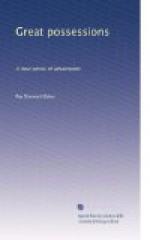Nor is it necessary in these days for the farmer or the country dweller to be uncultivated or uninterested in what are often called, with no very clear definition, the “finer things of life.” Many educated men are now on the farms and have their books and magazines, and their music and lectures and dramas not too far off in the towns. A great change in this respect has come over American country life in twenty years. The real hardships of pioneering have passed away, and with good roads and machinery, and telephones, and newspapers every day by rural post, the farmer may maintain as close a touch with the best things the world has to offer as any man. And if he really have such broader interests the winter furnishes him time and leisure that no other class of people can command.
I do not know, truly, what we are here for upon this wonderful and beautiful earth, this incalculably interesting earth, unless it is to crowd into a few short years—when all is said, terribly short years!—every possible fine experience and adventure: unless it is to live our lives to the uttermost: unless it is to seize upon every fresh impression, develop every latent capacity: to grow as much as ever we have it in our power to grow. What else can there be? If there is no life beyond this one, we have lived here to the uttermost. We’ve had what we’ve had! But if there is more life, and still more life, beyond this one, and above and under this one, and around and through this one, we shall be well prepared for that, whatever it may be.
The real advantages of country life have come to be a strong lure to many people in towns and cities: but no one should attempt to “go back to the land” with the idea that it is an easy way to escape the real problems and difficulties of life. The fact is, there is no escape. The problems and the difficulties must be boldly met whether in city or country. Farming in these days is not “easy living,” but a highly skilled profession, requiring much knowledge, and actual manual labour and plenty of it. So many come to the country too light-heartedly, buy too much land, attempt unfamiliar crops, expect to hire the work done—and soon find themselves facing discouragement and failure. Any city man who would venture on this new way of life should try it first for a year or so before he commits himself—try himself out against the actual problems. Or, by moving to the country, still within reach of his accustomed work, he can have a garden or even a small farm to experiment with. The shorter work-day has made this possible for a multitude of wage-workers, and I know many instances in which life because of this opportunity to get to the soil has become a very different and much finer thing for them.
It is easy also for many men who are engaged in professional work to live where they can get their hands into the soil for part of the time at least: and this may be made as real an experience as far as it goes as though they owned wider acres and devoted their whole time to the work.




